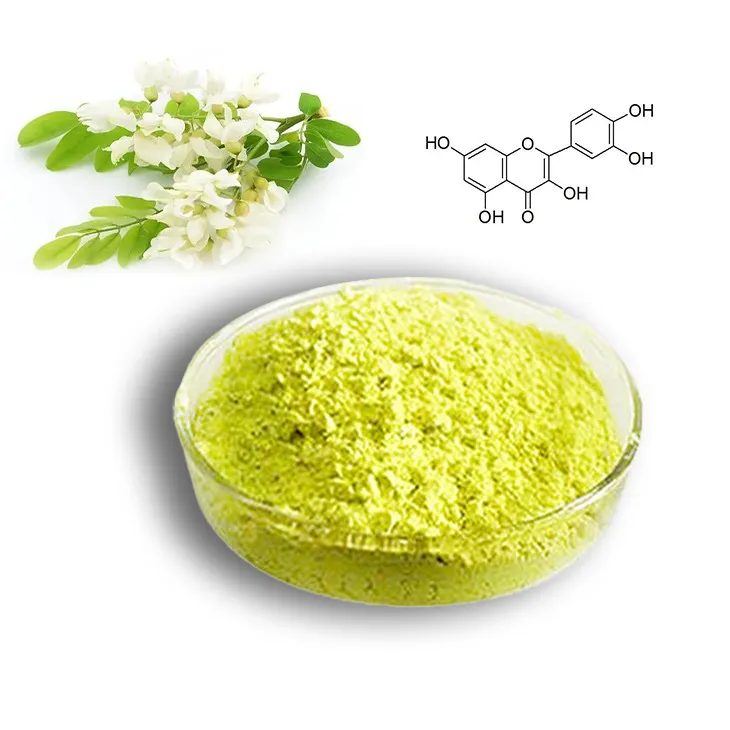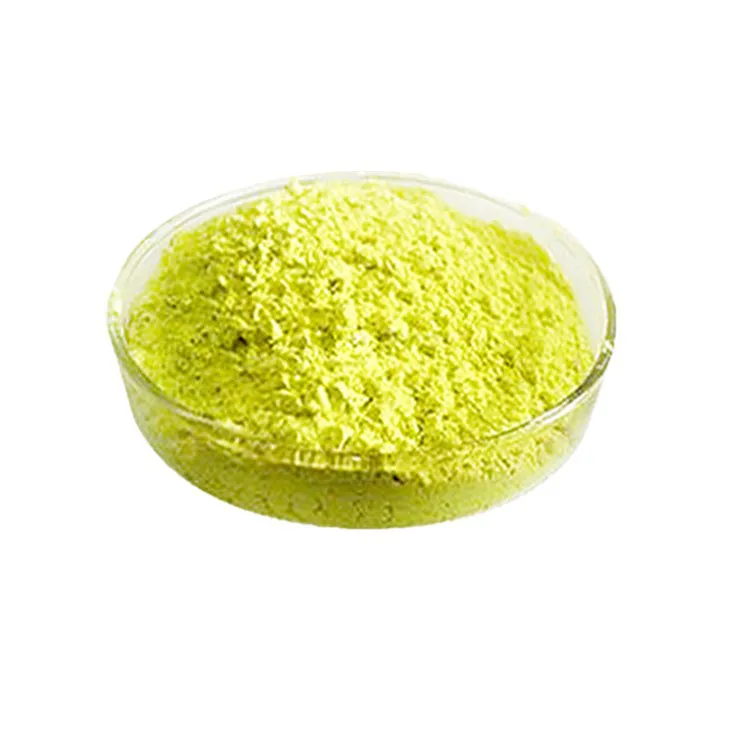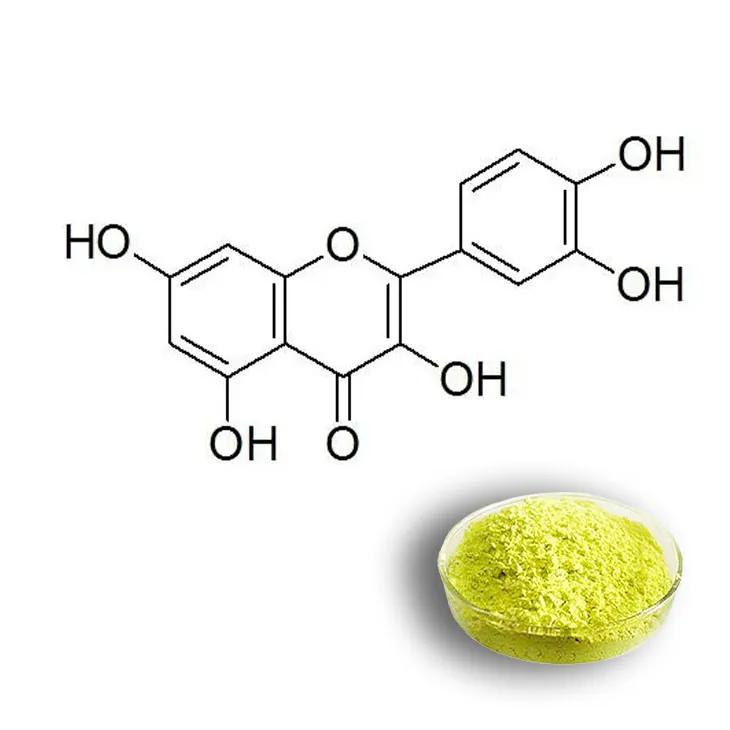- 0086-571-85302990
- sales@greenskybio.com
Quercetin with the highest praise.
2024-12-01

1. Introduction to Quercetin
Quercetin is a compound that has received high acclaim in the scientific and health - conscious communities. It is a flavonoid, a type of natural compound found in plants. This ubiquity in nature means that it is a common component of many plant - based foods. From fruits like apples, berries, and grapes to vegetables such as onions, broccoli, and leafy greens, Quercetin can be found in various dietary sources.

2. Antioxidant Properties
As an antioxidant, quercetin is truly remarkable. Antioxidants play a crucial role in maintaining the health of our cells. In the body, normal metabolic processes generate free radicals. These are highly reactive molecules that can cause damage to cells, proteins, and DNA. This damage, known as oxidative stress, is associated with a wide range of diseases, including heart disease, cancer, and neurodegenerative disorders.
Quercetin scavenges these harmful free radicals. It has the ability to donate electrons to free radicals, thereby neutralizing them and preventing them from causing further damage. This antioxidant activity is not only important for general health but also for the prevention of premature aging. By protecting cells from oxidative stress, quercetin may help to keep the body functioning optimally and reduce the risk of developing various chronic diseases.

3. Anti - inflammatory Effects
Inflammation is a natural response of the body's immune system to injury or infection. However, chronic inflammation can be a major contributor to disease. Quercetin has been shown to have significant anti - inflammatory properties.
It can inhibit the production of inflammatory mediators in the body. These mediators, such as cytokines and prostaglandins, are involved in the inflammatory response. By reducing their production, quercetin helps to dampen the inflammatory process. This anti - inflammatory effect has implications for a variety of health conditions. For example, it may be beneficial in the treatment of arthritis, where chronic inflammation of the joints can cause pain and disability.

4. Role in Allergy Relief
For those who suffer from allergies, quercetin may offer some hope. Allergic reactions occur when the body's immune system overreacts to a foreign substance, such as pollen or certain foods.
Quercetin can modulate the immune response related to allergic reactions. It may act on mast cells, which are involved in the release of histamine during an allergic response. By inhibiting the release of histamine and other inflammatory substances, quercetin can potentially reduce the symptoms of allergies, such as sneezing, itching, and runny nose.

5. Potential Anti - cancer Properties
In the field of cancer research, quercetin has shown some promising potential. Although more in - depth and extensive studies are still needed, there are indications that it could have anti - cancer properties.
One possible mechanism is by interfering with cancer cell growth and proliferation. Cancer cells divide uncontrollably, and quercetin may be able to disrupt this process. It could also induce apoptosis, or programmed cell death, in cancer cells. Additionally, quercetin may have an impact on the tumor microenvironment, inhibiting angiogenesis (the formation of new blood vessels that tumors need to grow) and preventing the spread of cancer cells to other parts of the body.
6. Benefits for Respiratory Health
Quercetin has also been associated with better respiratory health. Respiratory disorders, such as asthma, are characterized by inflammation and constriction of the airways.
It may help to reduce airway inflammation, improving breathing. In addition, quercetin may have a protective effect against respiratory infections. By enhancing the immune system in the respiratory tract, it can potentially prevent the invasion of pathogens and reduce the severity of infections.
7. Dietary Sources and Supplementation
As mentioned earlier, quercetin is found in a variety of plant - based foods. Incorporating these foods into the diet is an excellent way to obtain quercetin naturally. However, in some cases, supplementation may be considered.
When choosing a quercetin supplement, it is important to look for a high - quality product. Supplements are available in different forms, such as capsules, tablets, and powders. It is also advisable to consult a healthcare provider before starting any new supplement, especially if you have underlying health conditions or are taking medications, as quercetin may interact with certain drugs.
8. Safety and Precautions
In general, quercetin is considered safe when consumed in normal dietary amounts. However, like any substance, excessive intake can have potential risks.
High - dose supplementation may cause side effects such as nausea, headache, or stomach upset. Also, since quercetin can interact with medications, it is crucial to be cautious if you are on any prescription drugs. Pregnant and breastfeeding women should also exercise caution and consult their healthcare providers before taking quercetin supplements.
9. Future Research
Despite the many known benefits of quercetin, there is still much to be explored. Future research could focus on a number of areas.
For example, more in - depth studies on its anti - cancer properties are needed to fully understand its mechanisms of action and potential applications in cancer treatment. Additionally, research could investigate the optimal dosage and formulation for different health conditions. There is also a need to study the long - term effects of quercetin supplementation, especially in different population groups.
10. Conclusion
Quercetin is a highly praised compound with a wide range of potential health benefits. From its antioxidant and anti - inflammatory properties to its potential role in allergy relief, cancer prevention, and respiratory health, it has attracted significant attention in the scientific community.
While more research is needed to fully unlock its potential, incorporating quercetin - rich foods into the diet or considering supplementation under the guidance of a healthcare provider can be a step towards better health. However, it is important to be aware of the safety precautions and potential interactions to ensure its proper and safe use.
FAQ:
What is quercetin?
Quercetin is a compound that is widely found in nature and is a part of many plant - based foods. It has several beneficial properties such as being an antioxidant, having anti - inflammatory effects, and potentially being involved in modulating immune responses related to allergies and having possible anti - cancer properties.
How does quercetin act as an antioxidant?
Quercetin acts as an antioxidant by scavenging harmful free radicals. Free radicals can cause oxidative stress to cells, and by removing them, quercetin protects cells from this oxidative stress, which is important as oxidative stress is associated with many diseases.
What are the anti - inflammatory effects of quercetin?
Quercetin can inhibit the production of inflammatory mediators in the body. This helps in reducing inflammation within the body, which is beneficial for overall health as chronic inflammation is linked to various health problems.
Can quercetin help allergy sufferers?
Yes, it may offer some relief to allergy sufferers. Quercetin can modulate the immune response related to allergic reactions, potentially reducing the symptoms associated with allergies.
Does quercetin have anti - cancer properties?
While more studies are needed, there are indications that quercetin could have anti - cancer properties. It may interfere with cancer cell growth and proliferation, but further research is required to fully understand its role in cancer treatment and prevention.
Related literature
- The Antioxidant and Anti - Inflammatory Properties of Quercetin: A Review"
- "Quercetin and Cancer: Current State of Knowledge"
- "Quercetin in Respiratory Health: An Overview"
- ▶ Hesperidin
- ▶ Citrus Bioflavonoids
- ▶ Plant Extract
- ▶ lycopene
- ▶ Diosmin
- ▶ Grape seed extract
- ▶ Sea buckthorn Juice Powder
- ▶ Fruit Juice Powder
- ▶ Hops Extract
- ▶ Artichoke Extract
- ▶ Mushroom extract
- ▶ Astaxanthin
- ▶ Green Tea Extract
- ▶ Curcumin
- ▶ Horse Chestnut Extract
- ▶ Other Product
- ▶ Boswellia Serrata Extract
- ▶ Resveratrol
- ▶ Marigold Extract
- ▶ Grape Leaf Extract
- ▶ New Product
- ▶ Aminolevulinic acid
- ▶ Cranberry Extract
- ▶ Red Yeast Rice
- ▶ Red Wine Extract
-
Okra Extract
2024-12-01
-
Saffron Extract Powder
2024-12-01
-
Passionflower Extract
2024-12-01
-
Chia Seed Powder
2024-12-01
-
Licorice Root Extract Powder
2024-12-01
-
Berberis aristata Extract
2024-12-01
-
Curcumin
2024-12-01
-
Mulberry leaf Extract
2024-12-01
-
Marigold Extract
2024-12-01
-
Horse Chestnut Extract
2024-12-01





















